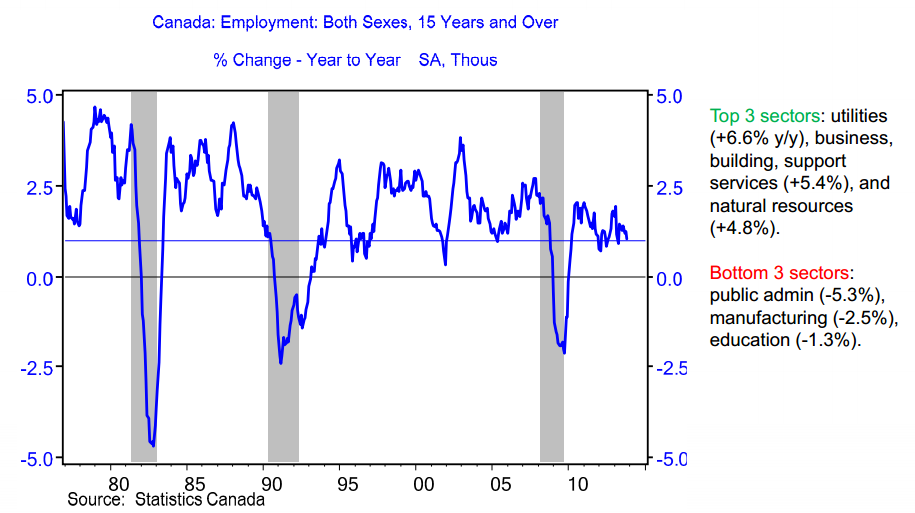
December job losses: “The economic recovery remains fragile”
While the Conservatives would say the economy is “still strong,” Finance Minister Jim Flaherty warns “the economic recovery remains fragile ” amid 45,900 in job losses in December – the steepest since the 54,500 drop in March. When all months are considered, only 102,000 jobs were created in 2013 and the unemployment rate rose 0.3% to 7.2% – which is higher than that of the United States (6.7%) for the first time since 2008. In addition, the US registered a 74,000 net increase for December.
“Not only was the headline contraction in December sizable, but the losses were broad-based across industries and exclusively seen in full-time positions,” TD Bank economist Sonja Gulati wrote in a report.
Finance Minister Jim Flaherty told CBC the poor results as a “reminder” of the fragile state of Canada’s economy.
“We sympathize with those Canadians who lost their job last month. This is a reminder that the economic recovery remains fragile and we must stay focused on our plan to grow the economy and keep taxes low to create the environment where job creation can flourish,” he said.
“It’s also important to remember that monthly job numbers are volatile and our overall trend is positive. Indeed, for 2013 as a whole, Canada’s economy created more than 100,000 net new jobs.”
Indeed, monthly results are volatile and cannot be an indicator of the direction of the economy, however, Chief Economist at RBC, Craig Wright told CBC the December losses were not only widespread, they decimated four months of job gains.
“More than half of the industries that they monitor were down. More than half the provinces experienced declines in the month. It was very broadly based and unfortunately focused on the full-time component.”
Despite economists’ pessimism, Finance Minister Jim Flaherty’s “reminder” and the numbers themselves, Industry Minister James Moore stuck to the Conservative narrative on the Canadian economy.
“The overall picture for the Canadian economy is still strong. The job picture is still strong,” Moore said.
“Still strong” but don’t forget that “the economic recovery remains fragile.”
The job losses aren’t over yet. Blackberry could see a 40% cut in workforce. Sears has announced several rounds of layoffs. Potash-corp is looking at cutting at least 1,000 jobs and Heinz is expected to hit the chopping block as well. To join the private sector in shedding jobs will be the public sector along with a fresh round of cuts in the upcoming budget and the overhaul at Canada Post that will change the way Canadians get their mail.
“The job market ended 2013 on a distinctly sour note, with the drop cutting the average monthly job gain to just 8,500 for all of last year versus more than 25,000 in 2012,” BMO Chief Economist Doug Porter wrote. “Digging beneath the ugly headline reveals more ugliness, as full-time jobs tumbled 60,000, and thus barely managed to rise at all last year.”
A Globe and Mail report on the state of the economy revealed a net increase of 17,000 jobs per month is necessary to meet the demands of a growing population, the average for 2013 falls 8,500 jobs per month short.
BMO Economist Benjamin Reitzes wrote in a report last month, “Compared to November 2012, employment is up a meagre 1%, with both the goods and services sectors clocking in at that pace. … This is hardly the stuff of a firm underlying economy.”
In addition, a graph of Statistics Canada data on job growth indicates 2013 was one of the worst years in a decade outside of a recession.
But, don’t worry, the Conservatives will continue to tout a strong economy, one fueled by lower taxes and “prudent” management. While the Conservatives attempt to scare Canadians into believing their opponents are tax-and-spend, we have yet to see what either the Liberals or NDP have to say on the matter. While the NDP have historically favored tax-hikes, and the Liberal about-face in 2011 to its introduction of tax cuts in the 1990s is not necessarily going to repeat in 2015.
The Conservatives have their Action Plan website and a slew of TV ads that advertise new jobs, low taxes, and a Canada Jobs Grant that doesn’t even exist. These ads in particular have cost the taxpayer $2.5 million and played twice during CBC’s Hockey Night in Canada playoffs, reassuring viewers, “The Canada Job Grant will result in one important thing – a new or better job.”
Their narrative is simple: they are the ones who can steer the economy forward. However, no matter the rosy rhetoric by Conservative Ministers on political talk-shows and their glorified ads, whenever a bump in the road appears, it is a “reminder” that “the economic recovery is still fragile.” A strong economy is not fragile, a weak one is. The job numbers have prompted alarm from the nation’s economists and has lead to gloomy prospects for 2014.
However, while Canadians across the country feel the bite of a Conservative economic agenda pollsters deem “out of touch,” the Conservatives intend to fight the next election on tax cuts after achieving a $3.7 billion surplus, which is all too meagre in comparison to the $13 billion surplus they squandered in 2006.
Bank of Canada Governor Stephen Poloz admitted Canada’s recovery wasn’t natural over the past three years, meaning it isn’t self-sustaining or self-generating. In other words, strip away the stimulus measures and Canada would likely still be in recession.
David Madani, the Chief Analyst at Capital Economics warns 2014 won’t be significantly better than last year, noting the excessive 164% personal debt on after-tax income burdening middle class Canadians, and an over-build of housing units as demand drops.
“So you have a situation where weakness in housing and slower household consumption growth is now offsetting the improvement in exports and perhaps business investment,” Madani says.
Economists are hopeful 2014 will see a rebound, but for a country that supposedly beats the rest of the G8 economically, having a higher unemployment rate than the United States and a sluggish year overall must be embarrassing for the Conservatives. However, the Conservative message is clear: the economy is “still strong” but “the economic recovery remains fragile.” Will you be banking on this message?




